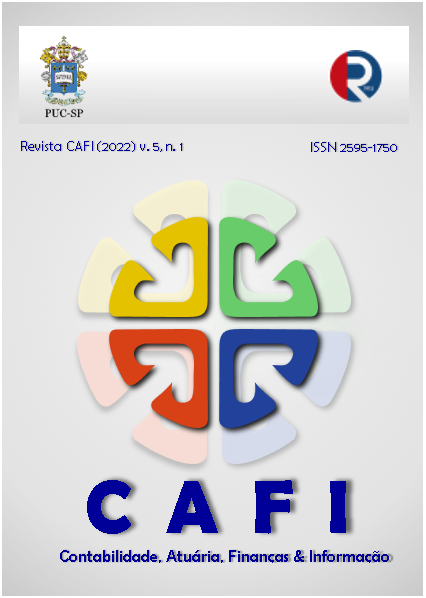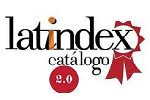Guia de Ferramentas de Gestão
Construção, Implementação e Aperfeiçoamento por um Grupo de Pesquisa Interdisciplinar e Internacional
DOI:
https://doi.org/10.23925/cafi.v5i1.57655Palavras-chave:
ferramenta de gestão, desenvolvimento, implementação, guia de ferramentasResumo
O estudo teve o objetivo de compreender como ocorreram as fases de construção, implementação e aperfeiçoamento do guia de ferramentas de gestão, por um grupo de pesquisa interdisciplinar (contabilidade, cadeia de suprimentos e práticas de recursos humanos) e internacional. O guia de ferramentas estudado nesta pesquisa é denominado Toolkit Diagnóstico SCA – EMP (Supply Chain Accounting and Employment Practices) e foi desenvolvido por um grupo de pesquisa da Universidade de Sheffield, no Reino Unido, envolvendo a participação de três universidades em diferentes países (Inglaterra, Brasil e a África do Sul) e com sete pesquisadores envolvidos em três áreas de pesquisa. Quanto a metodologia, trata-se de uma pesquisa qualitativa e a coleta dos dados ocorreu, por meio de uma entrevista semi-estruturada com o uso da narrativa episódica, com umas das pesquisadoras envolvidas no projeto. Os principais resultados evidenciam que o grupo na fase de construção utilizou como ponto de partida uma ferramenta semelhante em outro projeto sobre logística reversa. Na fase de implementação, as empresas que participaram da consulta quanto as melhorias que deveriam ser efetivadas durante a construção da ferramenta foram as primeiras a utilizarem o Toolkit. Quanto ao aperfeiçoamento da ferramenta, há planos para adaptar a ferramenta para o espanhol de maneira a expandir para mais outros países. A pesquisa justifica-se pela escassez de estudos que evidenciem o processo histórico de uma ferramenta construída de forma interdisciplinar e com pesquisadores internacionais, com a finalidade de conduzir as empresas a identificarem as melhorias na sua gestão.
Referências
Aligreri, L. M. (2011). A adoção de ferramentas de gestão para a sustentabilidade e a sua relação com os princípios ecológicos nas empresas. Tese (Administração). Universidade de São Paulo, USP.
Atkinson, A.A; Kaplan, R., S.; Matsumura, E. M.; Young, M. S. (2015). Contabilidade Gerencial: informação para tomada de decisão e execução estratégia. 4 ed. São Paulo: Atlas.
Bardin, L. (2006). Análise de conteúdo (L. de A. Rego & A. Pinheiro, Trads.). Lisboa: Edições 70. (Obra original publicada em 1977).
Baxter, J.; Chua, W. F.(2003). Alternative management accounting research: whence and whither. Accounting, Organizations and Society. 28, 97–126.
Caglio, A.; Ditillo, A. (2008). A review and discussion of management control in inter-firm relationships: achievements and future directions. Accounting, Organizations and Society, 33, 865–898.
Caglio, A.; Ditillo, A. (2012). Opening the black box of management accounting information exchanges in buyer–supplier relationships. Management Accounting Research, 23(2), 61-78. Recuperado de: https://doi.org/10.1016/j.mar.2012.03.001
Christopher, Martin.(2009) Logística e gerenciamento da cadeia de suprimento: criando redes que agregam valor. 2 ed. São Paulo: Cengage Learning
Cullen, J.; Meira, J. (2010).Inter-organisational accounting in dyadic settings. In: Accounting in Networks. Routledge. 35 – 58.
Dekker, H. C. (2003). Value chain analysis in interfirm relationships: a field study. Management Accounting Research, 14(1), 1-23. Recuperado de : https://doi.org/10.1016/S1044-5005(02)00067-7
Dibben; P.(2014).. Supply Chain Accounting And Employment Practices (Scap-Emp) Project. Perspectives Development is freedom: Development ideas after 20 years of freedom.
Dibben, P.; Meira, J.M; Linhares, C.; Bruce, R.; Wood, G. (2016). Vanishing value chains, industrial districts and HRM in the Brazilian automotive industry.The International Journal of Human Resource Management. Recuperado de: http://dx.doi.org/10.1080/09585192.2016.1233446
Fletcher, C.(2001) Performance appraisal and management: the developing researchagenda.Journal of Occupational and Organizational Psychology 74, 473–487.
Flick, U. (2009). Introdução à pesqusia qualitativa. 3 ed. Porto Alegre: Artmed.
Free, C. (2008). Walking the talk? Supply chain accounting and trust among UK supermarkets and suppliers. Accounting, Organizations and Society, 33, 629-662
Gil, A. C.(2002). Como elaborar projetos de pesquisa. 4. ed. São Paulo: Atlas, 2002.
Meira, J.M. (2011) Supply chain management and inter-organisational accounting: a brazilian case. Tese (Ph.d. at the management school ). University of Sheffield Management School.
Mentzer, J.T; Dewitt, W..; Keebler, J. S.; Min, S.; Nix, N. W; Smith, C. D..; Zacharia, Z.G. (2011) .Defining Supply Chain Management. Journal of Business Logistics, 22(2), 1-25. Recuperado de https://doi.org/10.1002/j.2158- 1592.2001.tb00001.x
Munday, M. (1992) Buyer-Supplier Partnerships and Cost Data Disclosure. Management Accounting, 70 (6), 28.
Nyaga , G. N.; Whipple, J.M.; Lynch, D.F.(2010) .Examining supply chain relationships: Do buyer and supplier perspectives on collaborative relationships differ? Journal of Operations Management. 28. 101–114.
Serviço Brasileiro de Apoio às Micro e Pequenas Empresas-SEBRAE.(2019) Conheça As Principais Ferramentas de Gestão. e-book. Recuperado de: <https://www.sebraeatende.com.br/e-book/conheca-principais-ferramentas-de-gestao>. Acesso em: 02 out 2021
SCA-EMP. (2017). Toolkit diagnóstico SCA – EMP. Recuperado de: http://sca-emp.com/br. Acesso em: 16 jan 2019
SCA-EMP. (2018). Toolkit no YouTube.. Recuperado de http://youtu.be/OcuD7FN9b4o. Acesso em: 19 jun 2020
Timming, A. R; Brown, R. (2015).Employee Voice through Open- Book Accounting: The Benefits of Informational Transparency. Social and Environmental Accountability Journal.
Wiengarten, F. Humphreys, P., Cao, G., Fynes, B; Mkittrick, A. (2010) Collaborative supply chain practices and performance: exploring the key role of information quality. Supply Chain Management – An International Journal, 15, 6, 463-473.
Yin, R.t K.(2015). Estudo de caso: planejamento e métodos. 5. ed. Porto Alegre: Bookman.
Downloads
Publicado
Como Citar
Edição
Seção
Licença
Copyright (c) 2022 CAFI

Este trabalho está licenciado sob uma licença Creative Commons Attribution-NonCommercial 4.0 International License.
Declaração de Direito Autoral
Autores mantém os direitos autorais e concedem à revista o direito de primeira publicação, com o trabalho simultaneamente licenciado sob a Licença Creative Commons Attribution que permite o compartilhamento do trabalho com reconhecimento da autoria e publicação inicial nesta revista.
Declaração de Privacidade
Os nomes e endereços informados nesta revista serão usados exclusivamente para os serviços prestados por esta publicação, não sendo disponibilizados para outras finalidades ou a terceiros.









